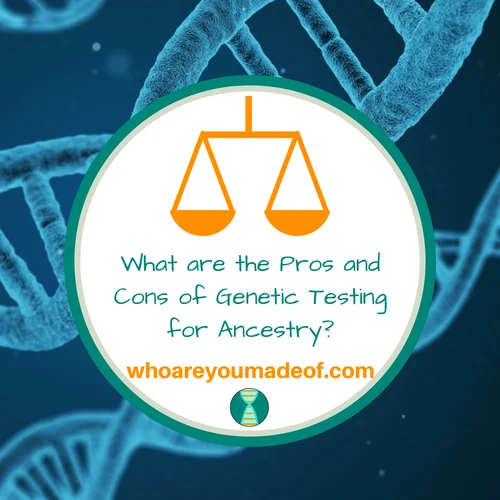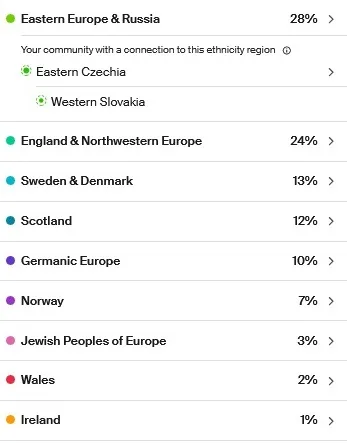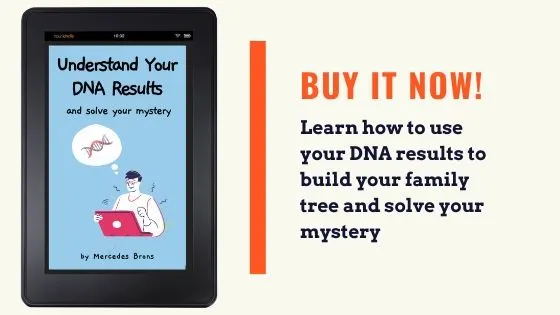In this post, you will learn the pros and cons of DNA testing for ancestry. This information will help you come to a more informed decision about whether or not this type of DNA test is right for you.
Are you on the fence about DNA testing? Are you wondering whether doing an autosomal DNA test for genetic ancestry is going to help you learn more about your family?

Is the science reliable? Is your data secure?
In the spirit of full disclosure, I should let you know that I am a huge fan of DNA testing. I decided to write this post because many of the articles that I read that are against DNA testing are written by people who have not actually tried it.
I've been writing about DNA testing and interpreting test results for a few years now, and have extensive genealogical research experience. My goal is to provide a fair and balanced view of the pros and cons for you, my dear reader.
Pros of DNA Testing for Ancestry
Autosomal DNA tests analyze your autosomal DNA, which is the DNA that you inherit on your numbered chromosomes. You inherit 50% of this DNA from your mother, and 50% from your father. This type of testing is incredibly useful.
The advantages I'll discuss here will focus primarily on the information that you can learn from this DNA.
Genetic DNA testing can give you an idea of where you ancestors lived
Every autosomal DNA testing company offers what is commonly known as an "ethnicity estimate". This is a basic estimate of where your ancestors may have lived going back as far as several hundred years.
Each company has a slightly different name for the ethnicity estimate, which is what it is called on Ancestry DNA. 23andMe refers to this report as an Ancestry Composition Report, and at Family Tree DNA it is a "myOrigins" estimate.
The important thing to know is that we inherit 50% of each of our parent's DNA, so the test can only "test" the DNA that we did inherit. It cannot reveal anything about the DNA that we did not get from our parents.
This is what my estimate looks like (from Ancestry DNA), as of July 2022:

DNA testing can help you prove that your family tree is accurate
When you get your DNA results back, you can go through your DNA matches and their family trees to get an idea as to how accurate your family tree is.
- Are you trying to prove that you are descended from someone famous?
- Want to figure out who your biological grandfather was?
- Do you want to solve that 100-year old family mystery?
- Your DNA matches can help you do all of this, and more.
DNA testing can help you find living DNA relatives
If you know that you have living, breathing family members out there in the world, but you don't know how to find them, DNA testing can help find them. My mother found two first cousins who were previously unknown to her family, along with dozens of other more distant relatives.
Some people find siblings, parents, nieces, nephews, aunts, uncles, and cousins that they never knew about before. Who will you find?
Genetic testing for ancestry is much cheaper than hiring a professional genealogist
DNA testing is a very useful tool for building a family tree or verifying research. It's fun and easy to learn how to use DNA like this, and so the average person will be able to do it on their own.
DNA testing usually costs around $100 (sometimes less if you catch a good sale), which is much cheaper than the $2000-5000 that you might pay to a professional genealogist to research your family tree.
Adding your DNA to the database of testing companies can help others learn about their families
Even if you aren't interested in continuing your family tree research, doing a DNA test just to know about your ethnicity actually helps others learn more about their ancestry.
You'll show up as a DNA match, and they can see matches that they share in common with you - or don't share in common with you - to determine more about their DNA matches. So you are actually helping people out even if you aren't actively involved in the process.
You can take your DNA results to the next level by uploading to other sites and painting your chromosomes
Since this post is for people who haven't decided to test yet, I won't go into too many details about this advantage. All I'll say is that you can get as involved, scientific, and technical as you want with your DNA.
Want to learn how to paint your chromosomes? Triangulate DNA segments to find common ancestors? Isolate specific locations on a chromosome attributed to a particular gene?
You can do all of this - and more - with your simple DNA test results.
Not interested in getting all scientific? That's okay, too - you don't have to. You can still learn a lot just by exploring the basics.
DNA testing could lead into a fun new hobby for you, like it did for me
When I was a teenager and young adult, I was generally bored with old family stories. My paternal great-grandmother and great-great grandmother had both done extensive family tree research.
They had traveled all over the US and even to Europe in search of family documents and information, so I thought that there wasn't much left for me to really do, assuming I would ever be interested.
Boy, was I wrong!
I had completely overlooked the fact that almost no research had been done on my mother's side of the family, and that many maternal lines are ignored in family tree research.
While I became slightly more interested in genealogy after starting a family, DNA testing is what really got me hooked on the family tree research. You can be as involved as you want to be in this new hobby, and I've made new friends and family connections along the way.
It is my favorite thing to do now! I'm under 40, and in love with a hobby that I thought was not for me.
Cons of DNA Testing For Ancestry Purposes
Alas, nothing is perfect - DNA testing included. Even though I am a very big fan of DNA testing, I sincerely tried very hard to come up with an objective list of disadvantages, even though I don't want to discourage you from testing.
Because you deserve as much information as possible, however, so here it goes:
There are limitations to what you can learn from DNA testing
Towards the beginning of this post, I mentioned that we only inherit 50% of our parent's DNA. This means you only inherit 50% of your mother's DNA and 50% of your father's DNA.
This also means that there is 50% of DNA from each of your parents that you don't inherit, and this is one of the major limitations of autosomal DNA testing.
Contained within that 50% of DNA that is not passed down from both of your parents is DNA that could reveal more information about your ethnicity, DNA matches, and family migration routes.
Furthermore, this pattern of only inheriting 50% of DNA from either parent occurs each generation, and valuable information is lost each time. Our genome is not long enough to share DNA with all of our ancestors, so there is a lot of information about our family's history that is not contained in our DNA.
This means that we can't learn everything about our family tree through DNA testing. It is not a substitute for traditional genealogy research.
You can discover uncomfortable family secrets through DNA testing
DNA testing is only recommended for people who are ready to learn anything and everything about their family, including the good, the bad, and the ugly. DNA doesn't lie to us, it doesn't know how to spare our feelings, and it doesn't know how to keep secrets.
People have discovered that the father (or mother!) they grew up with wasn't their biological parent, half-siblings, and other surprise family relationships through testing.
Additionally, people often discover an ethnicity that surprises or disappoints them - so you really have to be the kind of person who can handle these types of shocks.
You might not like your DNA relatives
If you find close family that you weren't expecting, there is a chance that you won't like them. With the advent of social media, we often learn more about our relatives than we might like to know, and sometimes it can be disappointing to learn that our newly discovered family members don't share our values in common.
How many of us have connected with old school friends on social media, only to learn that we don't like their politics, or that they have changed so much since middle school that we no longer have anything in common with them?
The same thing can happen with DNA matches and other relatives that we find through our research. I know that I am not alone in having connected with a second or third cousin, only to discover that we have drastically different views on life.
DNA testing technology is relatively new, and there is still a lot to learn
The technology for determining ethnicity estimates is still relatively new. The DNA testing companies occasionally rollout updates to their estimates, either because of updated technology for comparisons, or bigger/improved reference populations.
This often gives people the impression that the science is unreliable, when it is actually a developing science. Even so, for those looking for definitive answers right out of the box, this can be a disadvantage.
For many people, DNA testing for ancestry is still a luxury
While DNA testing is cheaper than it used to be, it isn't free, and is still considered a luxury some people just can't afford. DNA testing can cost between $50-200 for an autosomal DNA test and more than $200 for other types of DNA testing.
Even though a DNA test is less expensive than hiring a professional genealogist or an annual subscription to some genealogy records services, it can still be too expensive for many people to afford.
There are some privacy concerns
Many people are very concerned about their privacy, especially since it seems that we have so little of it in the modern days of the internet. There are some legitimate privacy concerns when it comes to DNA testing.
This is why it is important to research the company that you want to use for your DNA test to see how your genetic data, as well as other personal information, will be used. Only take a DNA test with a reputable company after you completely understand their privacy policies.
So should I take a DNA test?
I am still of the opinion that DNA testing offers far more benefits than disadvantages, and I recommend it to everyone - including my friends and family. While I understand that it won't turn into a fun hobby for everyone, I think learning more about where we came from can help us better understand who we are, and even who we want to become.
From learning about our immigrant ancestors to exploring where our ancient ancestors might have lived, DNA testing provides us with a really amazing resource.
Are you ready to take a test? I recommend testing with Ancestry DNA, and you can get your test via the following link. I'll get a small commission if you decide to purchase through this link, which is really appreciated! Discovery the story AncestryDNA® can tell
Conclusion
I hope that this post helped you understand a little more about what you can and can't do with your DNA test results, some of the limitations that currently exist, and pros and cons that you might not have considered before.
If you have any questions about something that you read here, or would like to add a comment, I would love to hear from you in the discussion below.
Thanks for stopping by!

